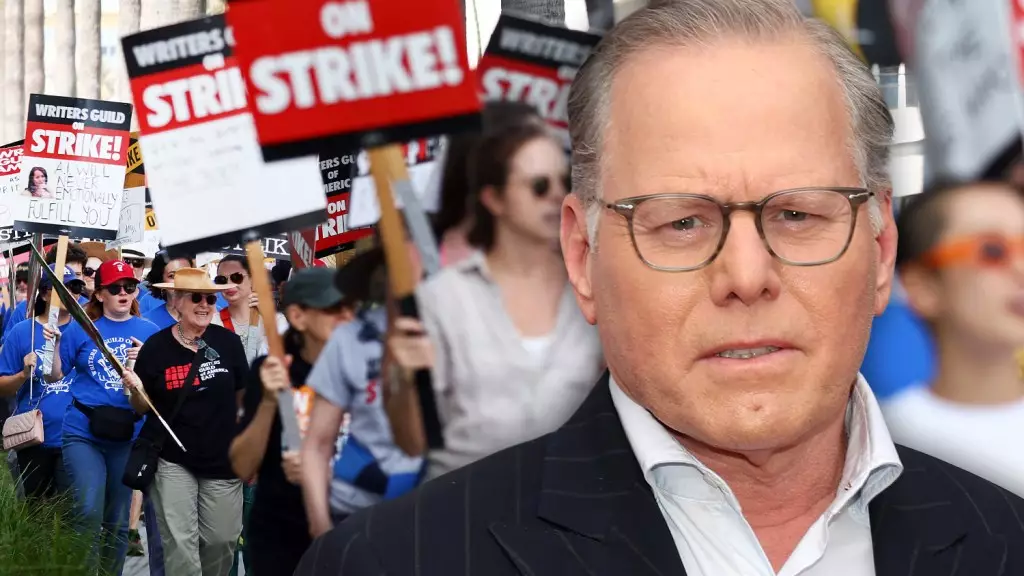The rise and fall of media executive David Zaslav has been a subject of intense fascination in recent years. Zaslav, the CEO of Warner Bros Discovery, has made headlines for his controversial decisions and now finds himself at the center of a new storm. In a surprising turn of events, Zaslav has praised the Writers Guild of America (WGA), an organization he previously clashed with. This unexpected change in attitude has left many wondering what exactly led to Zaslav’s downfall and his subsequent change in demeanor.
Alienation and Praise
David Zaslav has never been one to shy away from controversy. From cutting a completed project for a tax write-down to his exorbitant compensation package, Zaslav has often found himself in the crosshairs of critics. One of his most notorious actions was his clash with the Writers Guild of America, which resulted in a bitter five-month strike that paralyzed Hollywood. However, in a surprising turn of events, Zaslav now publicly praises the WGA and acknowledges that they were right about many things.
A Change of Heart
Zaslav’s newfound admiration for the WGA comes as a shock to many, considering the acrimonious nature of their previous relationship. In a recent interview with the New York Times, Zaslav expressed his willingness to overpay for talent and assets, highlighting his regret over underestimating the value of the writers. This change in attitude appears to be a complete reversal from his previous stance, where he criticized the demands of the striking writers as unrealistic.
The End of the Strike
The strike between the Writers Guild of America and the major studios came to an end in September after 148 days of tension and stalemate. Thanks to the intervention of industry heavyweights like Zaslav, a tentative agreement was reached between the parties involved. The deal, overwhelmingly approved by the WGA members, included significant gains in terms of AI guardrails, residuals, staffing, data transparency, and health and pension contributions. Although the value of the deal fell short compared to other industry agreements, it marked a turning point for Zaslav’s relationship with the WGA.
Despite being initially vilified by the striking writers for his lavish compensation, Zaslav played a crucial role in resolving the strike. According to industry insiders, he actively participated in the negotiation process alongside other prominent media executives such as Bob Iger and Ted Sarandos. While Iger and Sarandos focused on broader issues, Zaslav took a more legal approach, working behind the scenes to help facilitate the final agreement.
A Critical Profile
The New York Times recently published a comprehensive profile on David Zaslav titled “How David Zaslav Blew Up Hollywood.” The article delves into Zaslav’s numerous missteps, financial overreaches, and debt management issues. It highlights the extensive layoffs, show cancellations, and films that have been casualties of Zaslav’s leadership. The profile offers a scathing analysis of his managerial decisions and their impact on the entertainment industry.
Zaslav’s compensation package has long been a subject of public scrutiny and criticism. As You Sow, a nonprofit organization, has consistently ranked him as one of the most overpaid CEOs. Their annual list for CEO compensation shows that Zaslav’s pay far exceeds what is considered reasonable, with a significant portion categorized as overpayment. These figures have not only drawn the ire of shareholders but also become a focal point in labor strikes, including the recent actions by the writers and actors guilds.
The Changing Landscape
The increasing discontent with CEO pay ratios and the growing gap between executive compensation and median worker pay have fueled the backlash against Zaslav and others in the industry. Shareholders and the public are demanding greater accountability and fairer distribution of wealth. The continued scrutiny of CEO pay packages and their impact on company performance has forced media executives like Zaslav to reassess their compensation structures and management strategies.
David Zaslav’s fall from grace and subsequent change in attitude towards the Writers Guild of America signify a turning point in his career. His clashes with industry stakeholders and controversial decisions have highlighted the need for greater transparency and accountability in the media landscape. As the industry grapples with the evolving demands of creators, workers, and shareholders, the role of executives like Zaslav will continue to be scrutinized, reshaping the future of Hollywood.

